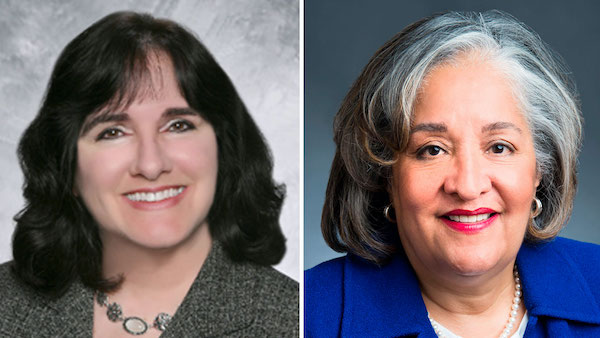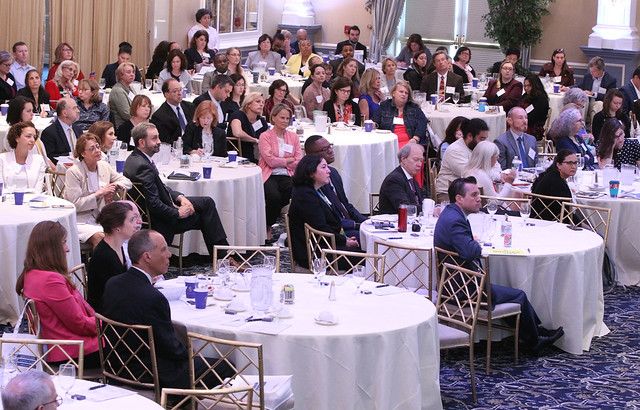Site Search
- resource provided by the Forum Network Knowledgebase.
Search Tip: Search with " " to find exact matches.
As we enter the spring months, I want to let you know that registration has now opened for CNJG’s 2025 Conference for the Social Sector —Stronger Together: Philanthropy & Civic Engagement!
This very special convening on June 18 will bring together funders and nonprofits for a full day of shared learning, exchange, and networking. Our conference features national and local thought leaders, and a range of experts, for a day of connection, not-to-be-missed discussion, and side-by-side learning with foundation and nonprofit colleagues.
We’re pleased to announce our keynote speaker, Dale R. Anglin, Director, Press Forward, a growing coalition of 88+ local and national funders committed to investing more than $500 million to strengthen communities through local news. Press Forward now includes 36 locally led chapters in 29 states, including one in our state — the New Jersey Civic Information Consortium.
This is CNJG's largest event of the year and your chance to join us as we examine how funders and nonprofits can work together to address and increase civic engagement, focusing on several key areas, including advocacy, local media, participatory budgeting, guaranteed income, public-private partnerships, the arts, and youth education through the lens of civic participation. Special early bird rates are available until April 12 – so please register soon.
We’re thrilled to have PSEG as our Signature Sponsor, Sixers Youth Foundation as a Collaborator Sponsor, and the Robert Wood Johnson Foundation as a Connector Sponsor. We have several opportunities available to support this very special event, and I hope you will consider sponsorship. Please reach out to Development Associate Fortunata Cuomo for more information.
In case you missed it, we recently launched the Funder Briefing Series: Making Sense of Federal Policy: Understanding What it Means for New Jersey. This series provides an overview of key issues that directly impact philanthropy, and more broadly, the charitable sector. The next session, on April 3 at 4:00 p.m., will focus on Education. There’s still time to register for the program.
And for your planning, the next briefings in this series are:
- April 10: Making Sense of Federal Policy: Understanding What it Means for NJ: Housing
- April 17: Making Sense of Federal Policy: Understanding What it Means for NJ: Media & Journalism
- April 24: Making Sense of Federal Policy: Understanding What it Means for NJ: Arts
We recorded the last three briefings in this series in case you missed them. We’re also creating a written summary for each briefing as another way for you to review the information. You must be logged in to access the recordings, summary documents, and resources.
- Making Sense of Federal Policy: Understanding What it Means for NJ: Immigration
- Making Sense of Federal Policy: Understanding What it Means for NJ: Health
- Making Sense of Federal Policy: Understanding What it Means for NJ: Environment
We believe that active participation in CNJG programs is essential for all members, their staff and trustees. Therefore, we strongly encourage you to attend and to share our programs with your staff and trustees.
The federal funding rollbacks and executive actions continue to harm nonprofits and the work they’ve built across education, healthcare, science, the arts, public media, climate, immigration, gender and racial justice, and countless other issue areas that are at stake. Foundation leaders and funders are exploring ways to respond and step up. The Trust-Based Philanthropy project, along with Grantmakers for Effective Organizations and the National Center for Family Philanthropy, coordinated a call-to-action for philanthropy to “meet the moment.” While philanthropy can’t replace federal funding, funders can “work together to move in solidarity with nonprofits, mobilize money in trust-based ways, and nurture possibility and innovation.” I invite you to join our colleagues from across the county in signing this pledge to be part of the solution.
In a recent NJ Spotlight News op-ed entitled “NJ nonprofits need your help,” Linda Czipo, President and CEO, New Jersey Center for Nonprofits, reminds us:
There is a good chance that your life has been made better because of a nonprofit… Perhaps you were born, gave birth, or received life-saving treatment at a nonprofit hospital. Maybe you learned from “Mister Rogers,” “Sesame Street” or other shows developed by nonprofits. You may have enrolled your children in childcare or after-school programs so you could go to work. You may have been uplifted, moved, or inspired by a performance at a nonprofit theater….It’s easy to take the helpers for granted; after all, they’ve always been there in our hour of need. But now it’s the helpers who need help.
It's clear we’re in a time of uncertainty, and we’re wading into deeply uncharted waters. Philanthropy has a role to play, and CNJG is here to help navigate and inform your work. In addition to the learning series, we are curating resources, information, webinars, and convenings, as well as sharing CNJG member actions, New Jersey-focused response funds, and more via the Executive Actions Response & Info tab. Please check back often. And please help us keep the information current and updated by sharing your actions and stories with Manager of Communications Shakirat Odunsi.
If you’re hearing of surveys to gather information from NJ nonprofits, please share that information with us as well. Having the latest information supports thoughtful collaboration and decision-making in times of change.
The bottom line is, we must stand together with our nonprofit partners, do our part, and take courageous action now.
On your side,
Theresa Jacks, President and CEO
Council of New Jersey Grantmakers
FAQs for Benefit Survey
What is the New Jersey Foundation Benefits & Salary Summary Report?
Developed exclusively for CNJG members, the New Jersey Foundation Benefits & Salary Summary Report presents comprehensive benefits data specific to New Jersey's grantmaking community, alongside data from the Council on Foundations' annual salary survey. The last report, produced in 2017, can be found on our website.
Given increased scrutiny in the areas of compensation and benefits, the need to benchmark this information within the field has become even more important. The 2020 New Jersey Foundation Benefits & Salary Summary Report will make available critical information needed to determine fair compensation and benefits in the state across multiple organizational levels.
Who is eligible to participate in this survey?
To be eligible to participate in the survey, your organization must have at least one PAID (full-time or part-time) employee. The beginning of the survey will help respondents determine if they are eligible to participate. Even if you are NOT eligible to participate, please complete the first four questions of the survey. You will then be directed to the last page of the survey where you will be asked to submit your data. You do not need to be a CNJG member to participate. If you do participate, but are not a CNJG member, you will receive a copy of the report.
Where do I complete the survey?
The survey may be completed here: https://www.surveymonkey.com/r/2020CNJGBenefitsSurvey.
When does the survey need to be completed?
The deadline for submitting completed surveys is August 10, 2020.
I'm not the right person to complete this survey, can I email it to someone else to complete?
You may forward the email that contains the survey link to someone else in your organization. The recipient will be able to click on the survey link to access the survey.
How long will it take to complete the survey?
It is estimated that entering in the data should take around one hour (not including the time it will take to research your organization’s information). If you offer more benefits, it may take more time; if you offer less, the less time it will take to complete. Logic is built into the online survey, enabling you to skip questions or entire sections depending on what your organization offers. CNJG suggests looking through the questions first (available in PDF form) and compiling your answers to then enter in the data all at once online.
How do I submit our information to the survey?
CNJG developed the survey using SurveyMonkey, so that you may enter all of your data online. The prompts at the bottom of each page guide you as you enter your information.
Can I see all of the questions first?
Yes! The survey in its entirety can be found below. Feel free to use this document to gather your benefits data, and then enter the information all at once online at https://www.surveymonkey.com/r/2020CNJGBenefitsSurvey.
For which year/time period should I provide compensation and benefits data?
The Benefits Survey should be based on benefits data for the 2020 calendar year. Please complete the survey questions by indicating the benefits that your organization is currently offering to employees in 2020.
Help! The way that this question is structured is difficult (or impossible) for me to answer.
We understand organizations provide different kinds of benefits and have developed novel benefit packages. And, often, benefit packages differ within an organization. Please complete the survey questions by indicating the benefits that are offered to the majority of employees in your organization, and please use the comment boxes after some of the questions and at the end of the survey to further explain/clarify your responses. Please also note that, while many questions are required (indicated with an asterisk) some questions in the survey are optional and can be skipped.
Once I've started the survey, can I save it and complete it another time?
Yes! You may leave the survey at any time by clicking on "Exit this survey" on the upper right hand corner of the page. Note: if you have just entered a page of data, proceed to the next page before you exit, otherwise the data just entered for the current page will not be saved. To reopen the survey, click on the link in the survey email that was sent to you.
Once I've completed the survey, how do I submit my input?
To submit your input, go to the last page of the survey and click on "Submit Survey." Your input will automatically be submitted.
I clicked on "Submit Survey," but I wasn't finished completing the survey - what should I do?
To make changes in a survey that has already been submitted, please contact Craig Weinrich. It will be possible for you to make changes to your survey input until the survey is officially closed on August 10, 2020.
What topics will be covered?
The following topics will be covered in the survey:
• Survey Eligibility
• Organization Information
• Employment
• Leave Benefits
• Insurance Benefits
• Retirement
• Other Benefits
• Retiree Benefits
• Benefits Cost
Who do I contact if I have questions?
Should you have any questions or need additional information, please contact Craig Weinrich.
CNJG thanks you in advance for your time and assistance with this endeavor. The report that we create becomes an important tool for you to benchmark your salaries and benefits plans for the coming years, so the time and effort will be incredibly valuable to your organization and other CNJG members.
Joint Statement from CNJG and the Center for Non-Profits
This statement also appeared on NJ Spotlight.
A conversation between two customers in line at a New Jersey supermarket turned ugly when one man denigrated the other with a racial slur and blamed the fellow shopper for the coronavirus pandemic.
With so much else going on these days, it would be so easy to react to such a seemingly minor incident by saying, oh well, these things happen. Times are tough; tempers are short.
But shrugging our shoulders is not an option. Doing so is complicity in a wrongful acts that too often are repeated, over and over. Our silence merely emboldens those who would tear apart the fabric of our society, whether through hate or ignorance – or the extremely volatile mix of the two.
It’s not difficult to connect the dots between “little” incidents and the systemic racism that leads to tragedies like the killing of George Floyd in Minneapolis. When we ignore or accept any examples of people being demeaned over what they look like or where they (or their ancestors) came from, we only open the door for massive abuses and the wrenching reckoning that follows them.
We mustn’t be cowed by fear of being seen as overly sensitive or labeled “politically correct.” This is about being morally and ethically correct in the face of bias and hatred – and that shouldn’t be too much to ask of Americans, regardless of their political party or ideology.
As state Attorney General Gurbir Grewal said recently, “COVID-19 is no excuse for racism, xenophobia, or hate. Discrimination and harassment in violation of New Jersey law remains illegal even if it occurs against the backdrop of a global pandemic." It’s gratifying to live in a state where the top law enforcement officer speaks out this way.
Unfortunately, it also is a state where reported hate crimes are up in recent years. We can’t tolerate such behavior, whether by police, elected officials or “average people.” There is too much at stake for bias to become the new normal.
As the leaders of the major philanthropic and non-profit membership organizations in New Jersey, representing both the wide range of non-profit groups and the multi-faceted funders of those groups, we feel compelled to speak out against the hateful responses we and our members have witnessed in reaction to the COVID-19 Pandemic.
Our country has seen countless examples of selfless sacrifice and good works over the past weeks, both on individual and institutional levels. We are proud that the members our organizations have been leaders in responding to the needs of our community.
But to our distress, some individuals are using the pandemic to put forward their bias and hatred toward their fellow citizens.
Times of crisis bring to the surface, on the part of some people, the need to scapegoat. Often, this takes the form of lashing out at particular groups, stirred up by inflamed rhetoric or more subtle code words or phrases, having no relationship to facts. In this time, there have been verbal and physical attacks against people of Asian and Pacific Islander background, as there were against Muslims after September 11 and against African-Americans and Latinos in countless other instances. This hatred and these attacks must stop.
The non-profit sector is the backbone of our communities, providing assistance and education to a wide range of people, in good times and especially in challenging times. Many of these services are a lifeline to people of all backgrounds, religions, ethnicities and statuses in life.
Non-profit organizations are the vehicle through which people can work together to selflessly assist others. People around the world view the United States as being unique in the breadth and depth of its charitable and philanthropic work, engaging the talents of all individuals, regardless of their economic or social status.
We call upon all people of good conscience in their good work to be alert for hateful words and actions and – always -- to speak out against them, both as individuals and as organizations.
Our language and our actions do matter.
Everyone, and especially people in positions of public trust or prominence, has the obligation to use our works and our lives to assist all in need and to honor the dignity and potential of all those we meet.
We call on not only our own members, but everyone who serves and volunteers in our sector to join us in this effort to speak out against racism and hatred and to exemplify all the best that we know our country is.
Maria Vizcarrondo
CNJG CEO and President
Linda Czipo
Center for Non-Profits CEO and President
William V. Engel
CNJG Board Chair
Gina M. Plotino
Center for Non-Profits Board Chair
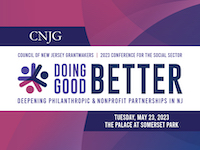
Date: Tuesday, May 23
Time: 8:00 a.m. to 4:00 p.m.
Location
The Palace at Somerset Park
333 Davidson Ave, Somerset, NJ
The Council of New Jersey Grantmakers is pleased to present our 2023 Conference for the Social Sector on May 23, 2023. The conference theme will focus on our initiative: Doing Good Better, a partnership between the Council of New Jersey Grantmakers and the New Jersey Center for Nonprofits. This long-term initiative aims to shift the culture of the New Jersey philanthropic and nonprofit ecosystem by encouraging funders, nonprofits, and government to create shared power rooted in collaboration, mutual trust, and respect.
The 2023 Spring Conference for the Social Sector: Doing Good Better will explore how funders and nonprofits can address philanthropy’s power imbalances, rethink traditional grantmaking practices to better serve New Jersey communities, and position equity as a driving force. For many years, but particularly in the context of the COVID-19 pandemic, natural disasters, and the heightened outcry for racial equity and social justice, funders have been urged to embrace more flexibility and transparency in their grantmaking. Practices such as general operating support, simplified application and reporting procedures, multi-year funding and others have been shown to level the power imbalance, advance greater equity, strengthen partnerships between funders and their nonprofit partners, and thereby improve community impact. The conference will present strategies and tools including trust-based philanthropy, participatory grantmaking, power redistribution, and others that we can all employ to inform and realign processes, systems, and culture in the social sector. Join foundation, philanthropic, government, and nonprofit colleagues to learn about and leverage these tools. Together, we will discover and strategize how we collectively can "do good better”.
| Agenda | |
| 8:00 - 9:00 am | Registration/Breakfast/Networking/Resource Marketplace |
| 9:00 10:00 am | Opening Plenary |
| 10:00 - 10:15 am | Networking & Resource Marketplace |
| 10:15 - 11:30 am | Breakout Sessions |
| 11:30 - 11:45 am | Networking & Resource Marketplace |
| 11:45 - 1:00 pm | Luncheon Plenary |
| 1:00 - 1:30 pm | Table Discussions |
| 1:30 - 1:45 pm | Networking & Resource Marketplace |
| 1:45 - 3:00 pm | Breakout Sessions |
| 3:00 - 4:00 pm | Ice Cream reception/Networking/Resource Marketplace |
We are pleased to share Strengthening Philanthropy in Newark - Report to the Field 2015 from the Office of the Newark Philanthropic Liaison. First established in 2007, the Liaison office represents one of the nation’s first formal partnerships between a city and the philanthropic community. The initiative began as a partnership between the Council of New Jersey Grantmakers in collaboration with then Mayor Cory A. Booker. We are proud this unique partnership continues with Mayor Ras Baraka and his new administration.
This report provides a brief summary of some of the substantial activities and impact the Office of the Newark Philanthropic Liaison facilitated throughout 2015. The strategy of collective impact is thriving throughout Newark thanks in large part to the work of the Liaison, and the funding community’s support of and robust engagement with the Office of the Mayor and anchor institutions across the city continue to reap positive outcomes. The Office of the Newark Philanthropic Liaison is supported by: Bank of America, The Foundation for Newark’s Future, Geraldine R. Dodge Foundation, The MCJ Amelior Foundation, The Nicholson Foundation, Panasonic Corporation of North America, The Prudential Foundation, Schumann Foundation for New Jersey, Turrell Fund, Victoria Foundation, and PSEG Foundation providing in-kind support and meeting space.
More than 20 years ago, the Garden State’s philanthropic community began meeting informally to discuss issues of importance to grantmakers. In the late 1980s, fueled by the observation that philanthropy is more effective when grantmakers have a forum to communicate, exchange information, and take part in continuing education, CNJG was born.
By 1998, CNJG was an independent 501(c)(3) organization with a full-time executive director and approximately 80 members. In the years since, membership has grown to include more than 130 foundations, corporate giving programs, government and other public grantmaking organizations. Informal gatherings of likeminded individuals and organizations have been replaced by robust, highly valued seminars, convenings, workshops and conferences.
Extending Philanthropy's Contribution
Over the years, CNJG also actively engaged in a number of landmark initiatives including commissioning the first study of giving in the Garden State, NJ Gives, the first study of nonprofit health insurance provider conversions to for profit corporations, New Jersey Together (a major funder collaborative centered on youth development), a landmark effort looking at the systemic, long term fiscal challenges facing all levels of government in New Jersey entitled Facing Our Future, the creation of the Community Foundation of South Jersey, and creation of the Newark Philanthropic Liaison position within our state’s largest city administration.
View our CNJG Through the Years pictorial.
Public policy is a vital aspect of the work of many of New Jersey's grantmaking organizations and is an integral component of CNJG's programs and member services. CNJG's Policy Committee advise and assist CNJG in identifying issues for potential action.
In late 2023, CNJG’s Board of Trustees approved our first-ever Policy Agenda. The Policy Agenda aligns with CNJG’s 2023-2027 Strategic Plan, specifically Goal #3, Amplify Our Collective Voice. This agenda includes our approach to the work, followed by five policy priorities. Read or download the agenda.
Resource Websites
- United Philanthropy Forum Public Policy Focus
- Center for Non-Profits: Public Policy
- Council on Foundations’ Public-Philanthropic Partnership Initiative
- Council on Foundations’ Advocacy Resources
- Independent Sector: Policy and Advocacy
To learn more about what CNJG is doing to foster deeper relationships between New Jersey grantmakers and public and elected officials in Trenton and Washington, D.C., contact Theresa Jacks.
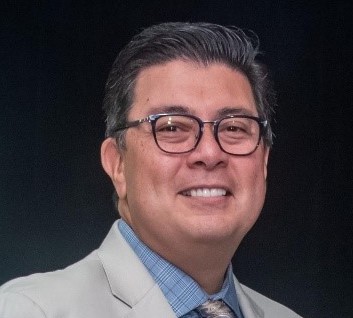
New Jersey’s philanthropic community mourns the loss of Jeffery Vega, who passed away January 28.
Jeff joined CNJG’s Board in 2016, and during his tenure served as First Vice Chair and Board Chair, and participated on multiple committees, affinity groups, and co-chaired the Trenton Area and Mercer County Funders affinity group. Jeff shaped and cultivated the direction and focus of CNJG through his supportive and proactive leadership. His direction and guidance during the pandemic helped CNJG not only stay the course, but continue to grow and thrive.
“Working with Jeff was a joy and a privilege,” CNJG President and CEO Theresa Jacks said. “Jeff guided us through the pandemic, a leadership transition, a strategic planning process, the approval of equity principles, and CNJG’s first-ever policy agenda with a steady hand, fierce commitment to equity, unwavering dedication to the membership, and the perfect combination of visionary thinking, wisdom, and kindness.”
His CNJG legacy includes the 2023 Strategic Plan, the creation of the Racial Equity Committee, CNJG’s first policy agenda, the New Jersey Principles for Philanthropy, and leading a dynamic and diverse board.
Jeff was the President and CEO of Princeton Area Community Foundation since 2015. Before joining PACF, Jeff was President of New Brunswick Tomorrow.
You can read more at the Princeton Area Community Foundation’s tribute page and announcement of Jeff’s passing.
President Obama's Hurricane Sandy Task Force released this rebuilding strategy to serve as a model for communities across the nation facing greater risks from extreme weather and to continue helping the Sandy-affected region rebuild. The Rebuilding Strategy contains 69 policy recommendations, many of which have already been adopted, that will help homeowners stay in and repair their homes, strengthen small businesses and revitalize local economies and ensure entire communities are better able to withstand and recover from future storms.
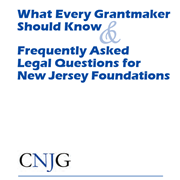
This guide was designed to help the state’s philanthropic community understand their ethical, legal, and fiduciary requirements and obligations.

Retributing Power by Simplifying and Streamlining Processes
Sisters of St. Joseph Health & Wellness Foundation
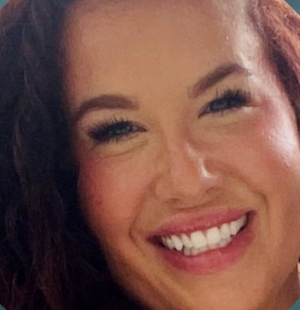 When Beth Collins joined the Sisters of St. Joseph Health and Wellness Foundation as the new Executive Director, she knew that the foundation could be doing more to support its nonprofit ecosystem. With a background in direct service, Beth remembered when she was on the other side of the funding relationship – sometimes spending hours writing lengthy application materials or digging up data to meet reporting requirements, all while juggling her never-ending to-do list. By aligning the values of Trust-Based Philanthropy to the virtues and mission of the Sisters of St. Joseph, she has catalyzed a shift toward redistributing power in its community partnerships.
When Beth Collins joined the Sisters of St. Joseph Health and Wellness Foundation as the new Executive Director, she knew that the foundation could be doing more to support its nonprofit ecosystem. With a background in direct service, Beth remembered when she was on the other side of the funding relationship – sometimes spending hours writing lengthy application materials or digging up data to meet reporting requirements, all while juggling her never-ending to-do list. By aligning the values of Trust-Based Philanthropy to the virtues and mission of the Sisters of St. Joseph, she has catalyzed a shift toward redistributing power in its community partnerships.
This power shift began when Beth started a conversation about values with the foundation board. By approaching the board with curiosity and bringing the voice of the community into the conversation, she set the tone for trust, openness, and an ongoing dialogue. The Foundation is now working toward fully embodying its values in its practices. The Sisters of St. Joseph have expanded their general operating support portfolio, shifted the bulk of the application process from applicants to the Foundation, replaced written reports with honest conversations, and created more opportunities for the public to provide feedback and engage in candid dialogue with the board. Focusing on only the essential information for applications and reporting has enabled staff to redirect their time and energy to develop wholehearted relationships with community partners. By starting with the why, Beth is leading the Foundation toward a clear vision for the how: “Trust Based Philanthropy is about humility – at Sisters of St. Joseph, we recognize that we are just one piece of the puzzle – and we are encouraging others to think outside of themselves.”
Offering Support Beyond the Check
Liberty Hill Foundation
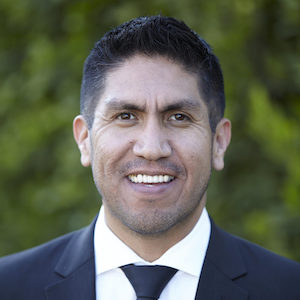 A community-funded foundation since day 1, Trust Based Philanthropy is at the core of the Liberty Hill Foundation. Centered on social justice campaigns, research, and policy initiatives designed to drive systemic change, Liberty Hill Foundation refers to itself as a "Laboratory for Social Change Philanthropy”. When Julio Marcial stepped into the role of Senior Vice President of Programs, he looked beyond the funding and considered the myriad of ways the foundation can support community partners beyond the check by connecting them to other funders and donors. As a member of several pooled funds in Los Angeles, Liberty Hill Foundation proactively seeks opportunities that will benefit their community partners. The Foundation has introduced many funders in their circle to Trust Based Philanthropy principles – this has sparked several conversations at other foundations serving Los Angeles county, several of which have since shifted their practices. Beyond private and public foundations, Marcial advocates for a push to Trust Based Philanthropy in California state funding agencies.
A community-funded foundation since day 1, Trust Based Philanthropy is at the core of the Liberty Hill Foundation. Centered on social justice campaigns, research, and policy initiatives designed to drive systemic change, Liberty Hill Foundation refers to itself as a "Laboratory for Social Change Philanthropy”. When Julio Marcial stepped into the role of Senior Vice President of Programs, he looked beyond the funding and considered the myriad of ways the foundation can support community partners beyond the check by connecting them to other funders and donors. As a member of several pooled funds in Los Angeles, Liberty Hill Foundation proactively seeks opportunities that will benefit their community partners. The Foundation has introduced many funders in their circle to Trust Based Philanthropy principles – this has sparked several conversations at other foundations serving Los Angeles county, several of which have since shifted their practices. Beyond private and public foundations, Marcial advocates for a push to Trust Based Philanthropy in California state funding agencies.
The Liberty Hill Foundation embraces itself as a fundraiser for its nonprofit partners and its responsibility for the Los Angeles community. The Foundation raises the funds and opens doors for nonprofits and then “steps out of the way,” says Julio. According to Julio, partnerships are the key to maximizing trust and impact in the community: “We can't do this without our partners, peers, and donors. We need to call each other out – and to call each other in.”
Leading with Trust, Transparency, and Responsiveness
Headwaters Foundation
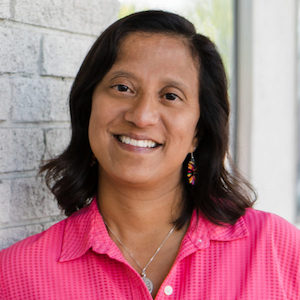 Headwaters Foundation is a health-conversion foundation working side by side with the community to achieve better outcomes towards a healthy and thriving Western Montana. Brenda Solorzano, CEO of Headwaters, has been at the helm of the foundation since its inception in 2017. With over 20 years of experience in traditional philanthropy, Brenda began asking big questions about standard philanthropic practices. Brenda is especially focused on tapping into the collective knowledge and experience of the community to create impactful systems. Early on in her tenure as CEO, Brenda shared her vision for Trust Based Philanthropy with the foundation’s board and they have supported her as she’s stewarded the foundation through its strategic planning process.
Headwaters Foundation is a health-conversion foundation working side by side with the community to achieve better outcomes towards a healthy and thriving Western Montana. Brenda Solorzano, CEO of Headwaters, has been at the helm of the foundation since its inception in 2017. With over 20 years of experience in traditional philanthropy, Brenda began asking big questions about standard philanthropic practices. Brenda is especially focused on tapping into the collective knowledge and experience of the community to create impactful systems. Early on in her tenure as CEO, Brenda shared her vision for Trust Based Philanthropy with the foundation’s board and they have supported her as she’s stewarded the foundation through its strategic planning process.
Community input and feedback was important to Brenda. With the board’s support, she took this a step further by engaging the community as co-creators and decision-makers. To accomplish this, Brenda invited 600 nonprofit representatives across the state to the table to share their thoughts. Brenda asked each person 2 questions: “If you were in my seat, what do you think the foundation should prioritize?” and “What’s the biggest challenge in your work?” By creating a space for open dialogue, Brenda took the pulse of the real challenges in Western Montana communities.
Soon after her introduction to Western Montana’s nonprofit sector, Brenda called on the community again to help design the foundation’s strategic focus. She hosted a series of public community meetings in each of Montana’s 15 counties. Headwaters facilitated a design-thinking process for members to discuss their challenges and co-create solutions. Two key strategies emerged: upstream systems and social change determinants prioritizing children and Indigenous populations.
Brenda engaged the community as decision-makers as Headwaters explored partner organizations for the foundation’s child thriving portfolio. The community nominated and voted on non-profit partners in a live meeting. This was a new approach and even some staff were nervous about the outcome. Headwaters proudly reports that a few years later, many of the organizations selected have grown to become blossoming collaborations. Grounded in Trust-Based principles since its inception, Headwaters is an exemplar of what it means to Do Good Better. Brenda says, “Trust Based Philanthropy is about starting from a place of trust.”
Co-Creating Goals by Soliciting and Acting on Feedback
T. Rowe Price Foundation
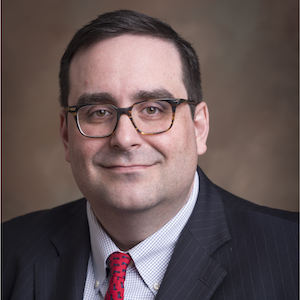 When John Brothers joined T. Rowe Price Foundation as President in 2015, the Foundation’s home in Baltimore was in the midst of social unrest following the tragic murder of Freddie Gray, a 25-year old Black man arrested over his legal possession of a knife and sustained injuries while being transported by the Baltimore Police. The T. Rowe Price Foundation recognized that it was a critical time to pause and listen to the Baltimore community. Within months of joining the Foundation, John Brothers and the Foundation team began an ongoing dialogue within Baltimore – in homes, places of worship, and community spaces. By leaning into the expertise and experience of community partners, John developed the T. Rowe Price’s Theory of Philanthropy, which mirrors principles to those similar to Trust-Based Philanthropy.
When John Brothers joined T. Rowe Price Foundation as President in 2015, the Foundation’s home in Baltimore was in the midst of social unrest following the tragic murder of Freddie Gray, a 25-year old Black man arrested over his legal possession of a knife and sustained injuries while being transported by the Baltimore Police. The T. Rowe Price Foundation recognized that it was a critical time to pause and listen to the Baltimore community. Within months of joining the Foundation, John Brothers and the Foundation team began an ongoing dialogue within Baltimore – in homes, places of worship, and community spaces. By leaning into the expertise and experience of community partners, John developed the T. Rowe Price’s Theory of Philanthropy, which mirrors principles to those similar to Trust-Based Philanthropy.
T. Rowe Price’s Theory of Philanthropy centers long-term impact by strategic investments in areas identified in partnership by those who live and work within the Baltimore community. The Foundation and community partners co-define a vision for success and community partners are trusted with the agency to make decisions in pursuit of shared goals. T. Rowe Price’s Theory of Philanthropy is considered a distinct model among other large corporate foundations. When asked how John managed to gain board consensus on this novel approach, he characterized the Theory of Philanthropy with a business metaphor: “People don’t buy stocks for an iPhone – they invest in Apple.” The Foundation focuses on supporting nonprofit organizations in a holistic way. By listening to the community early on, John shifted the Foundation’s approach from funding a variety of important, yet disconnected, programs to a co-creating strategic investment of capital and other support on more focused efforts that will have a lasting impact. To learn more please visit troweprice.com/foundation.
Doing Good Better, a partnership of the Council of New Jersey Grantmakers and the New Jersey Center for Nonprofits, is a community of funders and nonprofits taking action against the power imbalances and racial inequities in philanthropy, nonprofits, and government.
It’s summer – and that means summer reading! Whether you’re reading at home or in the coffee shop, at the beach, or while traveling by train or airplane, I'm thrilled to share a collection of summer reading recommendations from CNJG’s Board of Trustees and staff. While some recommendations speak directly to philanthropy and the social sector, others explore leadership, civic engagement, economics, and personal growth, all offering insights and ideas to excite our curiosity and inspire us.
Board Chair Craig Drinkard has been re-reading the timeless classic Good to Great by Jim Collins. Craig shared that so much more is resonating this time around as he re-reads it. The first time he read the book, the theory is what stood out; this time it’s deeper, more strategic, and thought provoking, with fresh insights gained during this second look. This book is worth a read for everyone dedicated to leadership and organizational improvement.
First Vice Chair, Justin Kiczek continues to be inspired by our recent convening, 2025 Conference for the Social Sector - Stronger Together: Philanthropy & Civic Engagementand recommends Habits of Heart and Mind: How to Fortify Civic Culture from Our Common Purpose - a publication he says has been a "continued source of wisdom and good ideas" and passes on to pretty much anyone he knows! He also follows two Substack columns focused on civic culture and renewal: Daniel Stid’s The Art of Association and Gabe Lerner’s Democracy Notes.
Treasurer Catherine Wilson has been diving into a diverse reading list including Autocracy, Inc.by Anne Applebaum, The Art of More: How Mathematics Created Civilization by Michael Brooks, and The Heat Will Kill You First: Life and Death on a Scorched Planet by Jeff Goodell.
Also from our board members:
Paul DiLorenzo is catching up on his back-dated New Yorker magazines and especially loved a story called Amelia Earhart’s Reckless Final Flights.
Maisha Simmons recommends checking out this insightful blog post: The Challenge and Opportunity for Funder and Nonprofit Listening Right Now.
Tammy Rice Herman has been reading the weekly blog, "Better Allies" where author Karen Catlin shares five simple actions each week to create a more inclusive and engaging workplace. You can sign up here to receive the blog every Friday.
Margarethe Laurenzi recommends listening to Ann Patchett at Parnassus Books talk about all the great books being written that serve as a rebuttal to the idea that literary fiction has lost its way.
Jasmyne Beckford has been enjoying reading Choosing Purposeful Alignment: The Messy Middle of Transformation. The book really speaks to her, “because it’s all about how growth happens in that uncertain, messy middle where you have to keep choosing what aligns with your values.”
Lucy Vandenberg’s summer reading and all year round includes her “daily devouring of The New York Times and NJ Spotlight!”
The CNJG team has a few reading recommendations for you too!
Senior Director, Member Experience, Craig Weinrich recommends Doughnut Economics by Kate Raworth, who argues that GDP should no longer be the sole indicator for a nation’s (and the world’s) economic health. Measuring something as complex as an economy needs an updated tool – thus the doughnut model that includes social and ecological benefits and harms, resulting from economic activity.
Manager of Programs and Learning, Chanika Svetvilas is currently reading Systemic: How Racism Is Making Us Sick by Layla Liverpool. She notes Liverpool's observation that “Racism is an insidious threat to our health precisely because it is so easily overlooked or, in some cases, perhaps willfully ignored.”
Manager of Communications Shakirat Odunsi picked up two books at United Philanthropy Forum’s UnConference last month: Future Good: How to Use Futurism to Save the Worldby Trista Harris and A New Era of Philanthropy by Dimple Abichandani. These picks reflect her interest in how our sector can evolve and adapt. Harris's work explores how futurist thinking can be applied to social change, while Abichandani's book examines the transformation happening in philanthropic practices and approaches. Both seem perfectly timed for those of us thinking about where philanthropy is headed next.
For my own summer reading, I've been reassured by reading Who is Government? The Untold Story of Public Service edited by Michael Lewis – the stories of the real women and men working in the public sector without bravado and bluster. These are the civil servants that oversee our veterans’ cemeteries, explore our universe, hunt down cyber criminals and preserve our archives. These unsung heroes do the daily, unseen, yet necessary work of the people. “Although they often go unnoticed, public servants are the heartbeat of our nation.”
I also recently read, Meditations for Mortals - Four Weeks to Embrace Your Limitations and Make Time for What Counts by Oliver Burkeman. I plan on re-reading it so I can gain some deeper insights during my upcoming sabbatical.
Yes – that’s correct - I will be on sabbatical beginning Monday, August 11, and will return to the office on Tuesday, October 14! I started my journey at CNJG in May 2008. I’m grateful to the CNJG Board of Trustees for giving me this opportunity, and grateful to an incredibly dedicated and competent team that will ensure work of the Council continues during my absence! Thank you!
Special thanks to Craig Weinrich, who will be the senior executive in charge, while I am on sabbatical. Please feel free to reach out to Office Manager Dana Schwartz, as well, at [email protected].
I'm struck by the breadth and depth of what our community is reading, from civic engagement and economic models to health equity and the future of philanthropy. These recommendations reflect the commitment to continuous and shared learning that makes our CNJG community so special. I’m looking forward to exploring some of these recommendations during my time away. And in case you missed it, the annual CNJG 2024 President's Report also celebrates what makes our CNJG community so special!
With appreciation,
Theresa Jacks, President and CEO
Council of New Jersey Grantmakers
Share your giving data and Get on the Map!
Your data will power valuable resources for your organization and our region including access to the CNJG Foundation Funding Map and COVID-19 Funding Map on the powerful interactive searchable mapping platform, engineered by Candid.
How to share your data
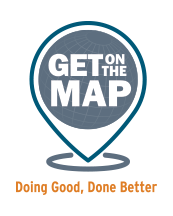 Export your grants data from your software system.
Export your grants data from your software system.
Most grants management software products have documented how to export the information.
If you don’t see your software provider on that list, download their eReporting template, an Excel spreadsheet, which you can use to complete the information they need.
Submit your data to Candid by emailing the completed template with your data in it to [email protected] and cc Craig Weinrich.
You can also follow the detailed instructions on this page.
Candid will make every effort to post your data to the map within 5 business days.
Get the answers to your Frequently Asked Questions including:
What information do I need to provide?
Why is it important to provide a grant description?
How is my grants data coded by Candid?
How frequently should I share my grants data?
How quickly will my information appear on my complimentary map?
Can I embed my complimentary map on my website?
What should I do if corrections need to be made to my data?
How will my grant information be used and shared?
How do I responsibly share sensitive grants data?
The 2020 Census is coming and it counts — in more ways than one.
The Census isn’t just a population tally. State and local governments, businesses, nonprofits and foundations, rely on Census data to allocate funding, define where services are delivered, and promote economic development. The information is valuable for health care, education, housing, transportation, and business. It helps determine congressional representation, political participation, and other fundamentals of community wellbeing and American democracy.
A full, fair count is crucial, but it isn’t guaranteed.
The Census disproportionately misses people of color, young children, and the rural and urban poor. Our state and nation have too much at stake for the social sector to stay on the sidelines.
The Council of New Jersey Grantmakers’ 2019 Spring Conference brought together foundation and nonprofit leaders throughout the state to learn what their organizations can do to make sure New Jersey is counted.
The Conference featured national and state experts who shared information and tools to meet the many challenges communities across the state will face to be counted. We heard serious concerns regarding access to the Census, hard-to-count people, and potential funding cuts and changes in the process that could hamper participation.
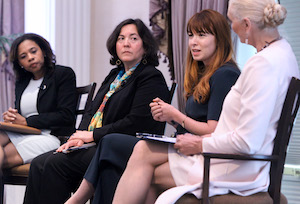 Speakers offered a number of opportunities for action and partnership, from spreading awareness about the importance of 2020 Census in your communities and networks to funding outreach efforts from grass-roots organizations. The Conference raised and answered the most important questions about the Census and what needs to be done for a complete and accurate count. Now, the social sector must build the capacity to meet this once-in-a-decade obligation to engage at the deepest level.
Speakers offered a number of opportunities for action and partnership, from spreading awareness about the importance of 2020 Census in your communities and networks to funding outreach efforts from grass-roots organizations. The Conference raised and answered the most important questions about the Census and what needs to be done for a complete and accurate count. Now, the social sector must build the capacity to meet this once-in-a-decade obligation to engage at the deepest level.
The Council of New Jersey Grantmakers looks forward to continuing conversations, partnerships, and action around the 2020 Census. Please explore our resources from the conference below and visit our webpage Philanthropy’s Role in the 2020 Census to learn more.
AGENDA
Opening Plenary: Census 101
A comprehensive update on all things census, including how the Census Bureau is getting the word out, what is guiding the planning for 2020, and what still needs to be done before Census Day.
Presenter: Jeff T. Behler, Regional Director, US Census Bureau - New York
What Philanthropy Can Do for the 2020 Census
Explore ways in which the philanthropic sector can leverage resources to ensure the most accurate census information, so the voices of undercounted groups and regions are heard in the decade to come.
Presenters: Gary D. Bass, Ph.D., Executive Director, Bauman Foundation
Vanita Gupta, President and CEO, The Leadership Conference on Civil and Human Rights
Moderator: Maria Vizcarrondo, President and CEO, Council of New Jersey Grantmakers
Session 1: Challenges to a Fair Count
Two experts in civil and voting rights law will walk us through what the citizenship question really means for the census count, and the potential impact it will have on already hard-to-count communities.
Presenters:
Ryan P. Haygood, Esq., President & CEO, New Jersey Institute for Social Justice
Ezra Rosenberg, Co-director of the Voting Rights Project, Lawyers’ Committee for Civil Rights Under Law
Facilitator: Bob Atkins, Director, New Jersey Health Initiatives--Robert Wood Johnson Foundation
Session 2: Where are the Kids? The Undercount of Children
Children are one of the largest undercounted populations in the Census. In this session, we will learn what your organization can do to prevent an undercount in 2020, and why an accurate count is essential for our children’s futures.
Presenters:
Peter Chen, Policy Counsel, Advocates for Children of New Jersey
Alana Vega, Kids Count Coordinator, Advocates for Children of New Jersey
Facilitator: Melissa Litwin, Early Childhood Program Director, The Henry and Marilyn Taub Foundation
Panel Discussion: Opportunities for Action
Nonprofit, foundation, and government leaders invite your organization to step up for the 2020 Census count. Panelists will provide concrete examples and resources to get involved now.
Panelists:
Kiki Jamieson, President, The Fund for New Jersey
Betsy Plum, Vice President of Policy, New York Immigration Coalition
Inge Spungen, Executive Director, Paterson Alliance
The Honorable Tahesha Way, New Jersey’s 34th Secretary of State, Department of State
Moderator: Linda M. Czipo, President & CEO, Center for Non-Profits
Luncheon Plenary: Call to Action for the 2020 Census: A Once-in-a-Decade Opportunity to be Counted
Another undercount for 2020 means another ten years of relying on inaccurate data to inform our state’s political representation and funding for vital resources. For too long, the census has missed disproportionate numbers of people of color, young children and the rural and urban poor, and with new challenges in 2020, participation of hard-to-count populations may be hindered further. With the count only a year away, now is the time for the philanthropic sector to step up and get New Jersey counted.
Speaker: Arturo Vargas, Chief Executive Officer, NALEO Educational Fund
CNJG thanks our conference sponsors and supporters: Signature Sponsor – PSEG; Collaborator Sponsors – The Fund for New Jersey and JPMorgan Chase & Co.; Connector Sponsors – New Jersey Natural Gas and Wells Fargo; Colleague Sponsors – FirstEnergy Foundation and Subaru of America Foundation; Exhibitor Sponsors – Glenmede and PKF O’Connor Davies; and Venue Sponsor – The Palace at Somerset Park.
Conference Photos
Additional resources, articles, and videos about the Census may be found on our webpage - Philanthropy's Role in the 2020 Census.
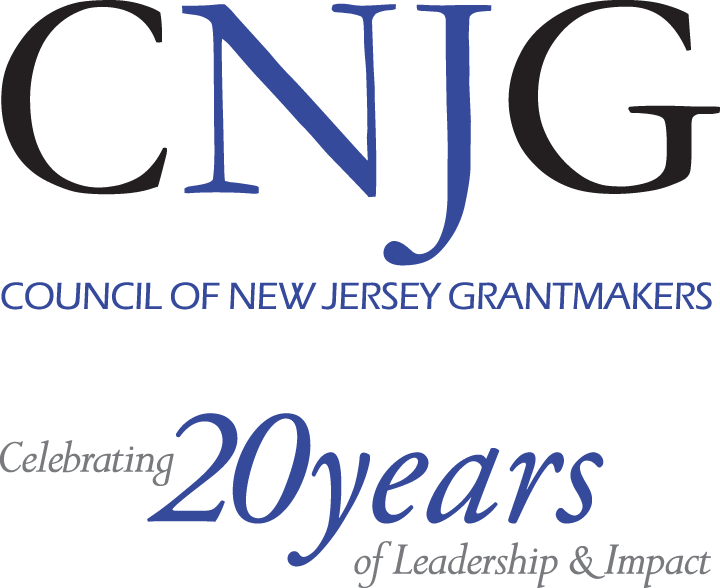 CNJG celebrates its 20th anniversary in 2017 marked by extraordinary progress and service to members over this time. As the nexus for the philanthropic community in New Jersey, the Council of New Jersey Grantmakers’ body of work grows more robust every year. This is clearly evident by the exponential growth in programs and services since CNJG was founded in 1987. However, this proliferation in programs and services does not reflect the full realm of CNJG's transformation over twenty years. CNJG has evolved to become a leader in the state, spearheading important and significant initiatives throughout our history.
CNJG celebrates its 20th anniversary in 2017 marked by extraordinary progress and service to members over this time. As the nexus for the philanthropic community in New Jersey, the Council of New Jersey Grantmakers’ body of work grows more robust every year. This is clearly evident by the exponential growth in programs and services since CNJG was founded in 1987. However, this proliferation in programs and services does not reflect the full realm of CNJG's transformation over twenty years. CNJG has evolved to become a leader in the state, spearheading important and significant initiatives throughout our history.
These programs, services and leadership initiatives elevate, not only our members’ work and practice, but also grantmakers throughout New Jersey, and even beyond. CNJG's success stems from its ability to broker partnerships and alliances to solve problems, leverage shared resources, and forge sustainable solutions to bring about long-term change. During its 20 years, CNJG has grown to become a valuable, highly relevant leadership organization serving a diverse range of funders. View our CNJG Through the Years pictorial. CNJG thanks our members and partners for your ongoing support and leadership that has propelled us through the last 20 years. We look forward to the next twenty!
Newark Philanthropic Liaison
Philanthropy has played a vital role in Newark for decades. In 2007, in collaboration with the Office of the Mayor, CNJG hired the city’s first liaison – modeled after a similar position in the State of Michigan – to harness interest, foster greater effectiveness and attract resources toward policy and programmatic areas that affect Newark’s residents. In the years since, the Council’s Newark Philanthropic Liaison has become a model for the country.
Hurricane Sandy Response
Superstorm Sandy officially came ashore in New Jersey on October 29, 2012 at 8:00 p.m. and its aftermath continues to be felt in communities throughout our state. Not 24 hours after the storm made landfall, CNJG began planning a series of actions to help inform funders what to be prepared for, share information and discuss strategies. CNJG's support of the philanthropic community as it navigates the shifting landscape of disaster recovery, continues.
Facing Our Future
Facing Our Future was a landmark initiative looking at the systemic, long term fiscal challenges facing all levels of government in New Jersey. It grew out of a 2010 briefing CNJG held for members that outlined how a Governor’s budget is annually crafted. CNJG leadership worked with members to convene a group of enthusiastic former government leaders. Their collective experience crossed party lines, and many of them had served multiple New Jersey governors. This Leadership Group included 4 former Attorney Generals, 3, former Commissioners, 2 former State Treasurers, a former Director of the State Senate and a former Chief Justice of the NJ Supreme Court, in addition to leading New Jersey researchers.
Establishing South Jersey’s Community Foundation
The Community Foundation of South Jersey formally launched in 2009 after two years of extensive planning through the efforts of CNJG and a number Council members. CFSJ is dedicated to the southernmost counties of New Jersey - Atlantic, Burlington, Camden, Cape May, Cumberland, Gloucester, Ocean, and Salem. These counties are exceptionally diverse, stretching from rural farm lands to pockets of densely populated and poor urban areas, juxtaposed against wealthy suburban communities. However, they share many of the same social problems – a challenging economy, unengaged youth, access to healthcare, as well as issues related to hunger, unemployment and housing. Realizing the need, Council members through the work of CNJG formed The Community Foundation of South Jersey. CNJG is extremely proud to have played a role in building the foundation to serve South Jersey for generations to come.
Spring Colloquium
Held for the first time in 2008, CNJG's Spring Colloquium focuses on critical trends and issues affecting foundations and the people and communities they serve. Past discussions have featured Governor Tom Kean with US Editor for the Economist Matthew Bishop, writer David Borestein and philosopher Anthony Appiah, and Idealist.org founder Ami Dar with Cindy Rizzo of the Arcus Foundation.
Spring Conference
CNJG's Conference for Grantmakers brings together staff and trustees of all types and sizes of foundations for a day of networking and focused sessions dealing with key aspects of grantmaking, leadership, and management and operations.

- 6 Practices of Trust-Based Philanthropy
- Trust-Based Philanthropy Resources
- Grantmakers for Effective Organizations: Systems Grantmaking Resource Guide
- Solving the World’s Biggest Problems: Better Philanthropy Through Systems Change
- Trust-Based Philanthropy News
- The Holy Grail of Funding: Why and how foundations give unrestricted funding
- The Casey Foundation’s Journey to Equitable Grant-making
- Community-Centric Fundraising
- Vu Le, Nonprofitaf.com
- To Support Shifts in Philanthropic Practices, Foundations Must Reimagine Their Internal Structures and Processes
Doing Good Better, a partnership of the Council of New Jersey Grantmakers and the New Jersey Center for Nonprofits, is a community of funders and nonprofits taking action against the power imbalances and racial inequities in philanthropy, nonprofits, and government.
This weekly conference call series welcomed New Jersey-based grantmakers along with national funders and provided an opportunity for grantmakers to hear from a wide range of experts in the field of disaster philanthropy. This series started on September 9, 2013 and concluded on November 4, 2013. The written summaries of each recording are listed below.
Native Voices Rising is a joint research and re-granting project of Native Americans in Philanthropy and Common Counsel Foundation. This report focuses on the practices and challenges of community organizing and advocacy, focusing on the need for increased investment in and sustained support for American Indian, Alaska Native and Native Hawaiian communities.
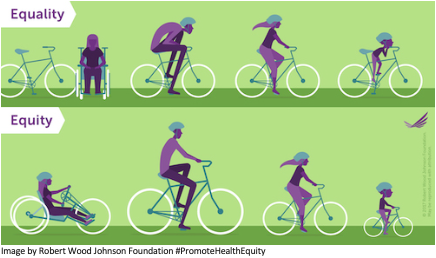
These articles are curated from news sources, philanthropic-focused publications, philanthropy serving organizations, and other places found on the internet. We encourage philanthropic organizations to read, share, and use the strategies suggested in these articles for your own diversity, equity, and inclusion learning journey. If there are others that you feel we should include, please contact us.
Chronicle of Philanthropy: Philanthropy Pours More Money Into Advancing Economic Wealth of Latinos (10/13/2022)
ABC News: Two New Jersey towns illustrate the race gap in the COVID pandemic (5/13/2022)
Chronicle of Philanthropy: General Operating Support Is Vital to Advancing Equity, Strengthening Nonprofits, Say Leaders (4/18/2022)
MacArthur Foundation: Movement to End Philanthropy’s Complicity in Anti-Blackness (4/18/2022)
Chronicle of Philanthropy: Nearly 500 Foundation Leaders Unite to Push for More Support of Asian Americans (3/26/2021)
Chronicle of Philanthropy: As Violence Against Asian Americans Intensifies, the Moment for Philanthropy to Act Is Now (3/17/2021)
Chronicle of Philanthropy: How One Family Foundation is Evolving to Refocus on Racial Equity (3/16/2021)
HealthDay.com: Many Adults Do Not See Link Between Racism, Poorer Health (1/27/2021)
Stanford Social Innovation Review: How to Begin Considering a Gender Lens Investing Strategy (12/10/2020)
Nonprofit Quarterly: How to Welcome Native Leaders to the Philanthropic Sector (12/3/20)
Chronicle of Philanthropy: Opinion Piece: Diversity Mandates from Foundations Maki It Harder for Nonprofits to Do Their Jobs Well (12/2/2020)
Chronicle of Philanthropy: Invest in and Strengthen People of Color: A Corporate Grant Maker Explains How (11/17/2020)
Nonprofit Quarterly: White House Declares Ban on Federal Racial Equity Trainings (9/14/20)
Nonprofit Quarterly: White Supremacy: Call It By Name (9/14/2020)
Denver Post: How Donors Can Advance Racial Equity (9/14/2020)
ROI-NJ: NJ to recognize Juneteenth as official state holiday (9/11/2020)
Chronicle of Philanthropy: The 'Warping Effects' of Philanthropy (8/25/2020)
Chronicle of Philanthropy: Companies Lead Philanthropic Response to Calls for Racial Justice, but Will It Last? (8/25/2020)
Exponent Philanthropy: Moving Towards Racial Equity in Philanthropy: Introducing an Anti-Racist Intersectional Frame (8/25/2020)
Inside Philanthropy: “A Moment of Reckoning.” How Can Funders Support an Equitable and Inclusive Arts Sector? (7/16/2020)
Generocity: Uprising in Philadelphia: A to-do list for the next six months (7/9/2020)
Boston Globe: The Problem is White Supremacy (6/29/2020)
Inside Philanthropy: Amid Demands for Change, Here’s How Philanthropy Can Back Underfunded Black-Led Group (6/18/2020)
Nonprofit Quarterly: This Moment Shows Us Why Philanthropy Should Reinvent Itself by Gislaine Ngounou, of the Nellie Mae Education Foundation (6/17/2020)
Chronicle of Philanthropy: Who Holds Philanthropy Accountable for Racial Justice? by Lisa Pilar Cowan, vice president of Robert Sterling Clark Foundation (6/16/2020)
Creative New Jersey: Summary and resources from their statewide conversation on Racial Justice (6/10/2020)
Chronicle of Philanthropy: 64 Black Foundation Leaders Tell Philanthropy to Go Big in Response to Pandemic and Police Killings (6/10/2020)
Stanford Social Innovation Review: Mass Decarceration, COVID-19, and Justice in America by Deanna Van Buren co-founder of Designing Justice + Designing Spaces and F. Javier Torres-Campos, Thriving Cultures Program Director at Surdna Foundation (6/9/2020)
Communications Network: Crowdsourced Anti-Racism Resources and Tools
NonprofitAF.com: Privilege, power, and personal conflicts: The forces preventing change in nonprofit and philanthropy by Vu Le (6/8/2020)
Philanthropy Network Greater Philadelphia: Articles and Resources from the webinar: The Crisis of White Supremacy in America: What’s Philanthropy’s Role (6/4/2020)
Chronicle of Philanthropy: Dismantling Racism Might Require Philanthropy to Dismantle Itself by Lisa Pilar Cowan, vice president of the Robert Sterling Clark Foundation (6/2/2020)
Chronicle of Philanthropy: Why All Grantmakers Should Seek to Fix Democracy by Suzette Brooks Masters, senior strategist at the Center for Inclusion and Belonging at the American Immigration Council (6/2/2020)
Southern Poverty Law Center: Authoritarian State or Inclusive Democracy? 21 Things We Can Do Right Now by Eric K. Ward, Senior Fellow (6/1/2020)
Nonprofit Quarterly: Dear Philanthropy: These Are the Fires of Anti-Black Racism by Will Cordery of Leverage Philanthropic Partners LLC & Astraea Lesbian Foundation for Justice (6/1/2020)
NonprofitAF.com: Have nonprofit and philanthropy become the "white moderate" that Dr. King warned us about? by Vu Le (6/1/2020)
Library Journal: Books on Anti-Racism (5/31/2020)
Stanford Social Innovation Review: Overcoming the Racial Bias in Philanthropic Funding by Cheryl Dorsey, Peter Kim, Cora Daniels, Lyell Sakaue, & Britt Savage (5/4/2020)
Stanford Social Innovation Review: For a More Equitable America, Understand Race and Racism as Actions We Do and Can Undo by MarYam Hamedani, Hazel Rose Markus & Jeanne Tsai (5/1/2020)
Jacobin Magazine: The Perils of Liberal Philanthropy by Karen Ferguson (11/2018)
Smithsonian Magazine: The 1968 Kerner Commisssion Got It Right, But Nobody Listened by Alice George (3/1/2018)
Continuum Chart on Becoming an Anti-Racist Multicultural Organization by Crossroads Ministry (2013)
The Characteristics of White Supremacy Culture from Dismantling Racism: A Workbook for Social Change Groups (2001)
Resource Generation: Guidance for Giving to Black-led Organizations for Black Liberation (undated)
Prison Policy Initiative: Prison Gerrymandering Project how the Census Bureau counts people in prison (undated)

